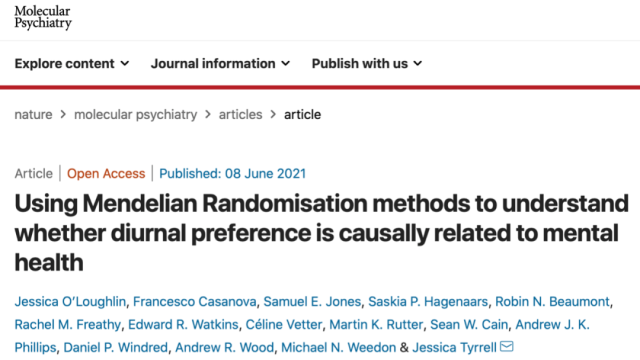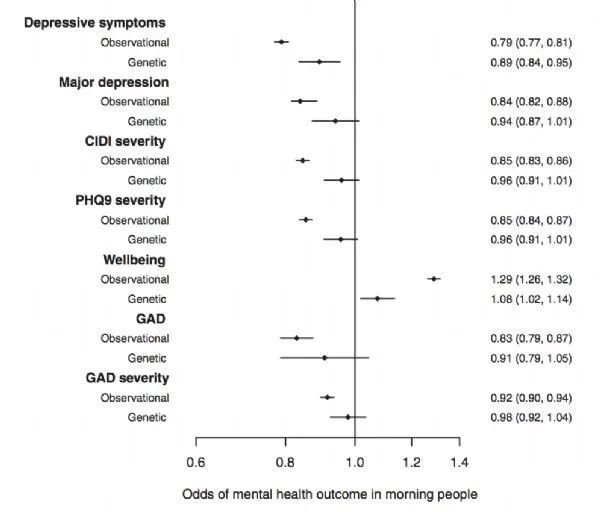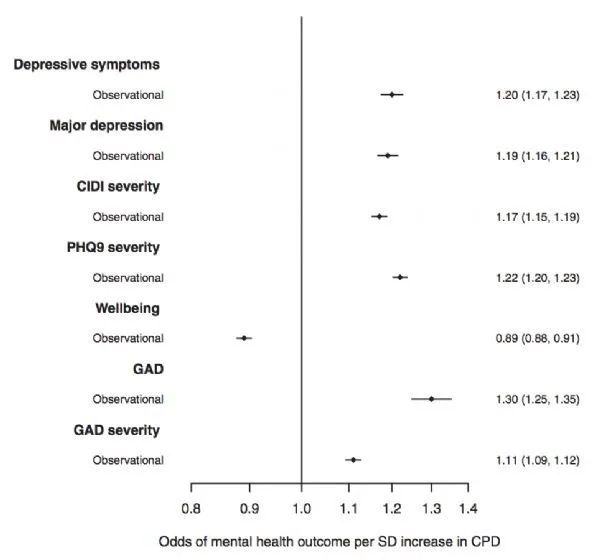Disrupted circadian clock may increase depression risk
- Normal Liver Cells Found to Promote Cancer Metastasis to the Liver
- Nearly 80% Complete Remission: Breakthrough in ADC Anti-Tumor Treatment
- Vaccination Against Common Diseases May Prevent Dementia!
- New Alzheimer’s Disease (AD) Diagnosis and Staging Criteria
- Breakthrough in Alzheimer’s Disease: New Nasal Spray Halts Cognitive Decline by Targeting Toxic Protein
- Can the Tap Water at the Paris Olympics be Drunk Directly?
Disrupted circadian clock may increase depression risk
- Should China be held legally responsible for the US’s $18 trillion COVID losses?
- CT Radiation Exposure Linked to Blood Cancer in Children and Adolescents
- FDA has mandated a top-level black box warning for all marketed CAR-T therapies
- Can people with high blood pressure eat peanuts?
- What is the difference between dopamine and dobutamine?
- How long can the patient live after heart stent surgery?
Disrupted circadian clock may increase depression risk. Are people who go to bed early and rise early happier?
The circadian rhythm, often referred to as the circadian clock , has been extensively studied by scientists.
Circadian rhythms impart temporal patterns to human behavior and physiology, aligning the body’s internal and external environment with expected changes.
It can be seen that the importance of the circadian clock to human health is self-evident.
Previous studies have shown that circadian rhythm disturbances alter the microenvironment around tumor cells, making them more favorable for tumor growth and hindering the body’s natural immune defenses. At the same time, working shifts or changing time zones regularly may suppress the immune system even more.
Of course, there are also studies showing that circadian rhythm disturbances increase the risk of depression and anxiety .
Individuals with different day and night preferences have different effects on physical and mental health.
Going to bed early and waking up early was associated with a lower risk of depression, while going to bed late and waking up late was associated with an increased risk of depression.
According to a new study published in the journal Molecular Psychiatry: People whose sleep patterns deviate from their natural circadian clock are more likely to suffer from depression and have lower levels of well-being , according to a new study published in the journal Molecular Psychiatry .
That is, people who went to bed early had a lower risk of depression and improved their own well-being.

Image source: https://www.nature.com/articles/s41380-021-01157-3
The research team previously identified 351 genetic variants associated with day-night preference. For the study, researchers examined circadian preference data from 451,025 UK individuals in the UK Biobank, exploring the relationship between analytics and mental health and subjective well-being.
Meanwhile, the researchers developed a new measure of “social jet lag” to measure changes in sleep patterns between work and leisure. They measured more than 85,000 participants with wrist-worn activity monitors and obtained sleep data.
The study found that 62.6% of the participants had a preference for getting up early, and this group was generally characterized by older age, female sex, lower body mass index (BMI), and fewer smokers. And people who don’t align with their natural circadian clock are more likely to suffer from depression and anxiety, and have lower levels of well-being.
 The relationship between circadian rhythms and mental health
The relationship between circadian rhythms and mental health
Specifically, compared with those who went to bed late and woke up late, those who went to bed early and woke up early had lower odds of developing depressive symptoms (OR: 0.79, 95%CI: 0.77, 0.81), and early rise had a protective effect on depression .
In addition, those who went to bed early and woke up early had higher subjective well-being and less circadian rhythm disorders than those who went to bed late and woke up late. Early risers had higher happiness scores (OR: 1.29, 95% CI: 1.26, 1.32). The results were consistent in males and females.

The relationship between circadian rhythms and happiness
In addition, the researchers also built on existing evidence of circadian rhythm disturbances in shift workers and concluded that shift workers often violated their circadian preferences, and some studies have shown that shift workers have a higher risk of depression and lower well-being.
Previous studies have found that the circadian clock s of people who go to bed early and wake up late are genetically linked, and that early risers caused by genes may lead to higher subjective well-being and a lower risk of schizophrenia and depression.
In conclusion, the study shows that early risers are more likely to align with their natural circadian clock , have a lower risk of depression, and improve their own well-being.
Reference:
Jessica O’Loughlin, Francesco Casanova, Samuel E. et al. Using Mendelian Randomisation methods to understand whether diurnal preference is causally related to mental health. Molecular Psychiatry (2021). www.nature.com/articles/s41380-021- 01157-3
Disrupted circadian clock may increase depression risk
(source:internet, reference only)
Disclaimer of medicaltrend.org
Important Note: The information provided is for informational purposes only and should not be considered as medical advice.



